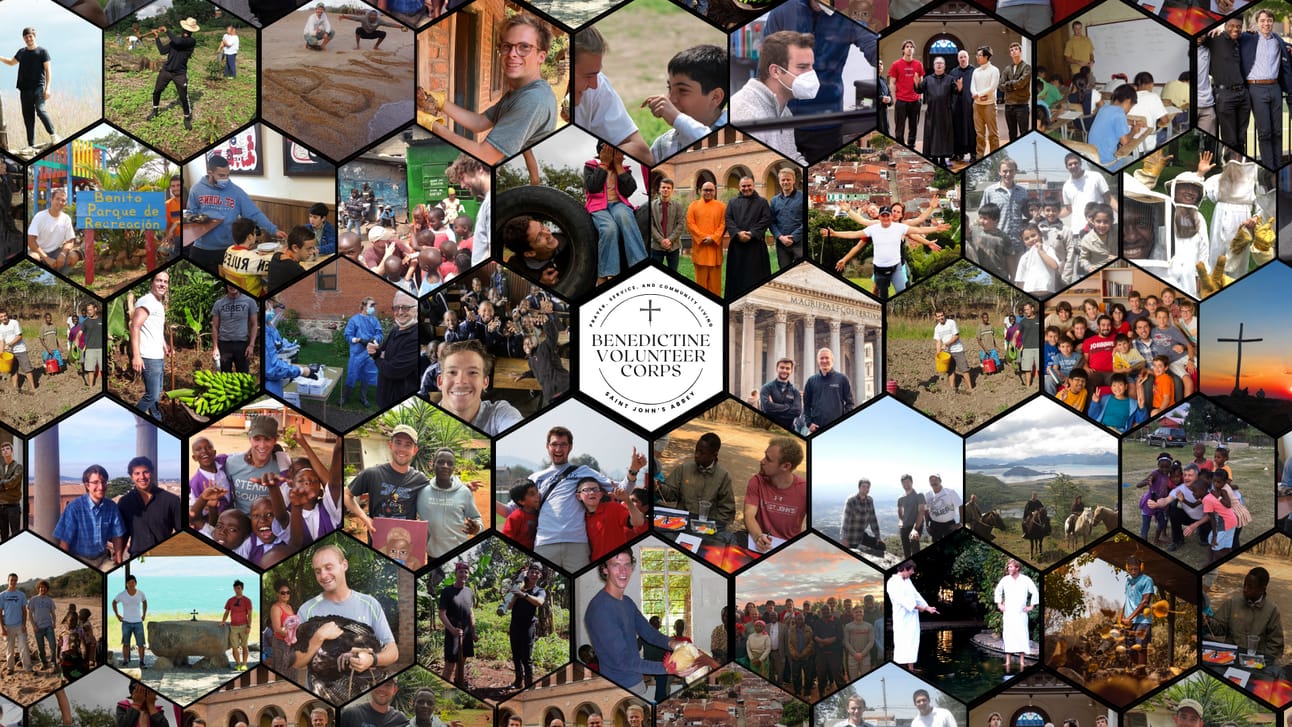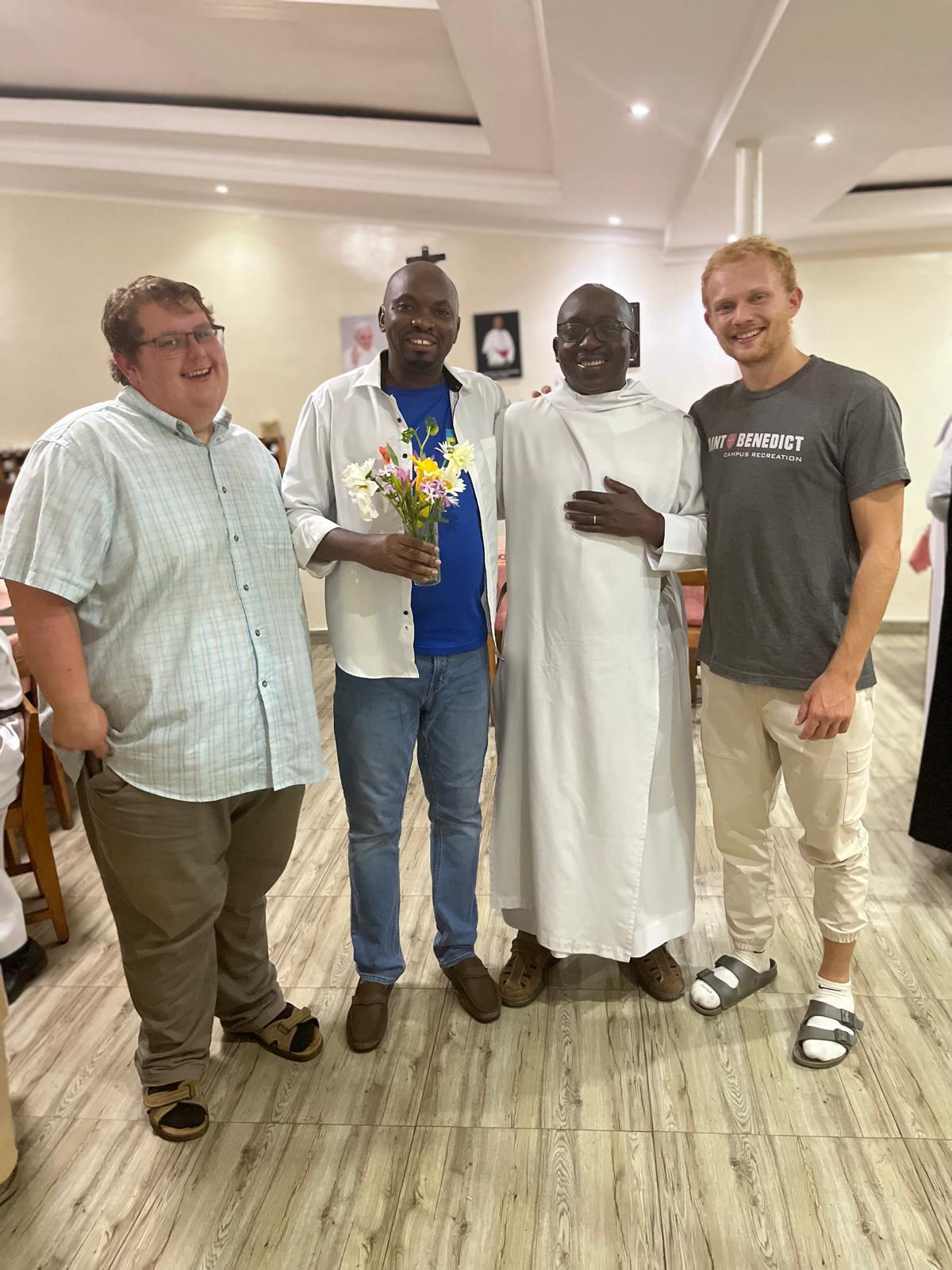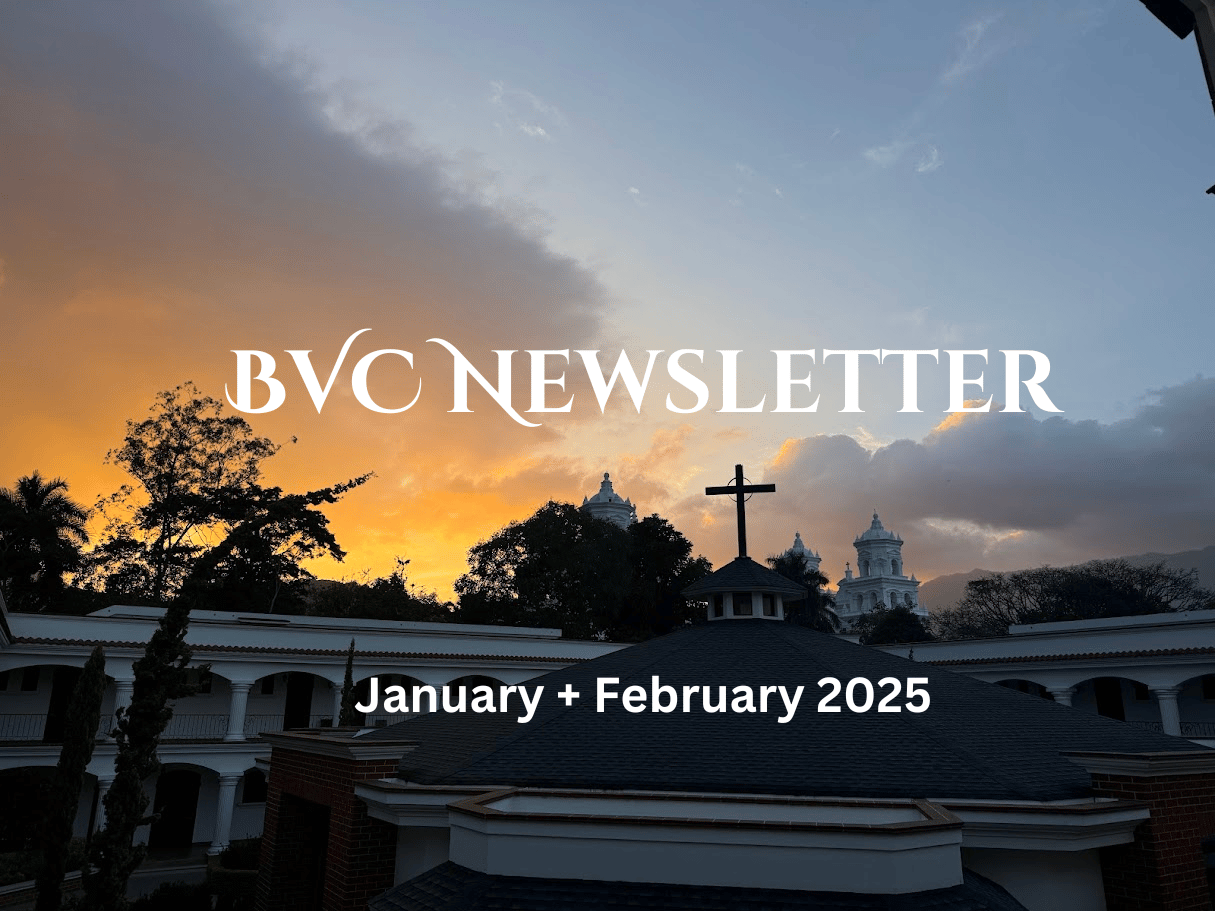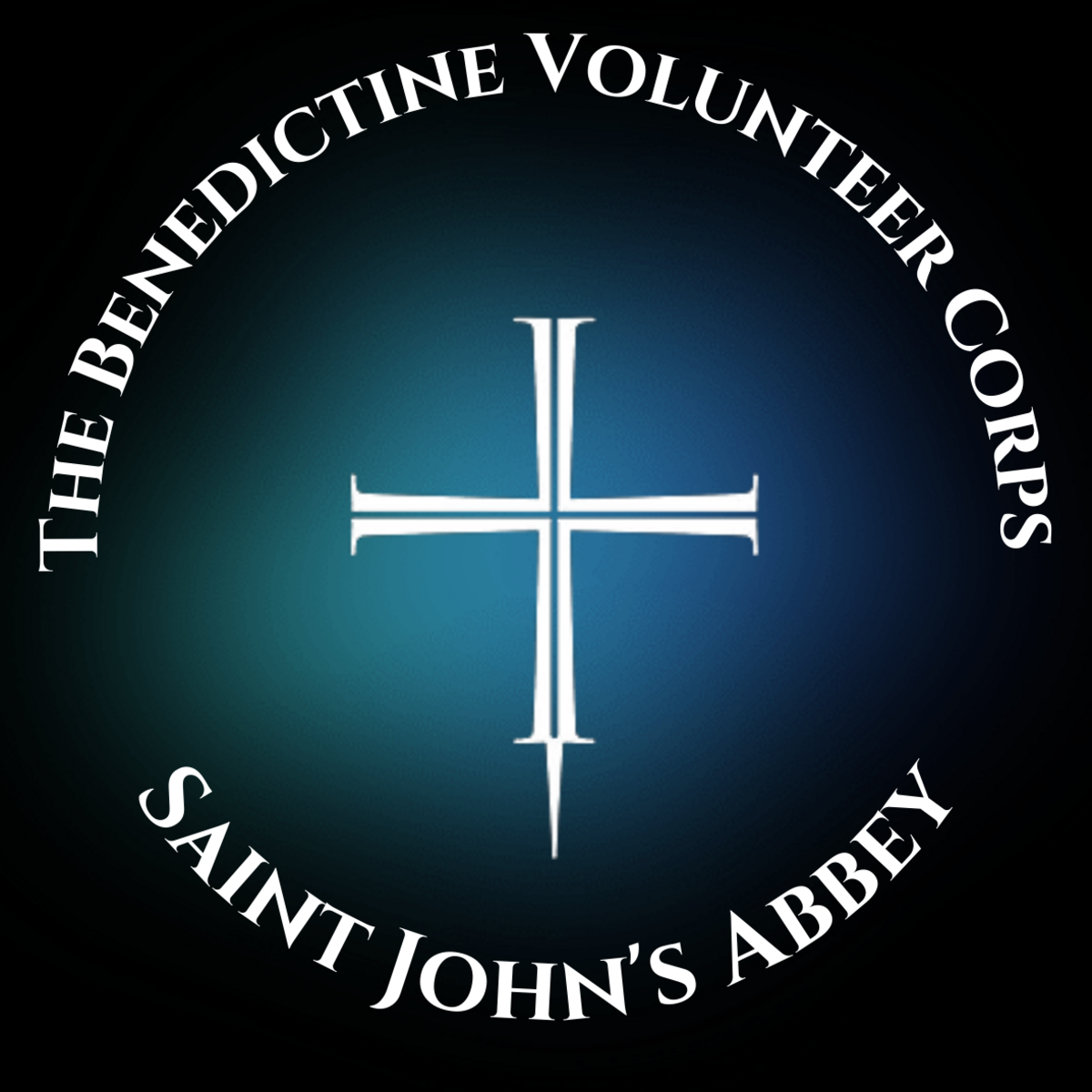
Prayer, Service, and Community Living; Worldwide to Transform Lives.
A Message from the new Director: Father Geoffrey Fecht

I am excited about my new role as Director of the Benedictine Volunteer Corps, succeeding Brother Paul Richards, who founded and directed the program for an incredible twenty-one years. He has left significant shoes for me to fill.
Logan asked me to provide some background information. In 2004, a year after Brother Paul founded BVC, I became the Director of Abbey Development. My position involved fundraising for abbey programs, including BVC, which grew from just a few volunteers in 2003 to twenty-six at its peak. My responsibilities also included funding various abbey projects, such as the construction of the Abbey Guesthouse, monastery renovations, and the Abbey Woodshop, as well as excellent programs in addition to BVC, including Latino Ministry, Spirituality, the Guesthouse, Health and Retirement, among others.
Several months ago, when the opportunity arose to engage directly with the Benedictine Volunteer Program, I eagerly told Abbot Douglas, "Yes," partly reflecting on my early years when I became a monk.
I began my journey as a monk in 1981. Yes, a very long time ago—though for me, it doesn’t seem as long ago as it must seem to our readers. That was when I became a novice, the first step toward monkhood, as one isn’t entirely a monk until making a heartfelt commitment through vows following the novitiate. Once I took those vows, I began working in campus ministry at the university, which was a remarkable experience. A highlight was directing the VISTO program: Volunteers In Service To Others. This program offered Johnnies an excellent opportunity to help in the Saint Cloud area by mentoring boys as Big Brothers, visiting seniors, supporting veterans, and collaborating with individuals facing physical and mental challenges. It was inspiring to see hundreds of Johnnie volunteers come together each year during my three years in campus ministry. I collaborated with a partner program at Saint Ben’s!
After three years in Campus Ministry, I took on the university's Director of Residential Programs role. I managed Resident Assistants and Faculty Residents, as well as the overall dorm experience. During my two years serving in this position, I also earned my Master of Divinity degree and was honored to be ordained as a priest. Following my time at the university, I became assistant pastor in Hastings, Minnesota, before transitioning to parish pastor in Freeport, Minnesota. Working in parish ministry brought me great satisfaction; however, after four fulfilling years as pastor in Freeport, I was appointed Prior of the Abbey, where I served for a seven-year term, first under Abbot Timothy Kelly and then Abbot John Klassen. Upon completing two full terms plus one additional year, I was appointed pastor of Saint Augustine Parish in Saint Cloud. I served there for a brief two-year period, after which Abbot John designated me as the Director of Abbey Development. With the exciting construction of the Abbey Guesthouse just kicking off, it was essential to bring someone on board to lead the fundraising efforts and gather the support needed for the abbey. As I mentioned earlier, I've held this position for twenty-one years, during which I've concentrated on encouraging donations for various abbey programs, including the Benedictine Volunteer Corps.
During my time at Abbey Development, I had the incredible opportunity to launch Abbey Travel Tours, a program aimed at deepening our connection with the abbey's generous donors. Through this initiative, I have increased the abbey’s donor base and met many wonderful people while further informing them about Saint John’s and allowing them to explore the world while broadening their horizons and immersing themselves in different cultures and beautiful places. However, this program has genuinely reinforced my deep passion for culture, history, and political science—subjects that I have been fascinated by since high school.
The BVC holds a special place in the hearts of all the monks at Saint John’s, as it does for many of our alumni. Taking on the role of Director of the Benedictine Volunteer Corps, with the capable assistance of Logan Lintvedt, presents a great opportunity that brings me full circle to the kind of service in which I was first involved during my Campus Ministry days. I look forward to working with and supporting our BVC volunteers in this significant worldwide outreach to Benedictine communities and the people they serve.
Project Untold: Joe Stangler

Joseph Stangler served in Humacao, Puerto Rico in 2022 and in Butare, Rwanda in 2023.
Like most volunteers, Joe Stangler (SJU '22) signed up for a single year of service. He expected that his time in Humacao, Puerto Rico would be a meaningful gap between undergrad and his future chiropractic studies. But then, about halfway through his first year, everything changed.
“I was on the phone with Hayden Hedrington (SJU ‘22),” Joe recalled. “We were just catching up when all of a sudden we both decided we’d do a second year. Hayden was volunteering in Tanzania at the time, and something about his experience drew me there. I knew I wanted my second year to be in Africa.”
Just one week before shipping out in August of 2023, Joe and his new partner, Logan Braaten (SJU ‘22), learned that their placement in Tororo, Uganda had been cancelled. Instead, they were assigned to open a brand new BVC site at the Monastere de Gihindamuyaga in Butare, Rwanda.
They arrived in a paradise of winding roads, rolling hills, and every kind of fruit imaginable. Best of all, people were everywhere; the whole community was always outside interacting in a way that you don’t see in America. Joe loved it. “No part of me has ever doubted that this was the right choice.”
Joe knew this was an opportunity to “squeeze all the juice out of the time he was receiving.”
He hit the ground running.
Their primary work responsibility was to teach English to local elementary students and members of the monastic community. “We had zero resources besides a chalkboard and our imaginations. It was really the blind leading the blind for a while there.”
Within months, Stangler and Braaten had launched two major fundraisers to help their efforts. They received over six hundred English books for the monastery and local schools. Additionally, they raised over $21,000 through a GoFundMe to cover school fees and to rebuild the roof of the school. Their initiative laid a solid foundation for future volunteers and for English education in Butare.
But it wasn’t just about these major successes; Joe thrived in small moments too.
He taught at an after-school English club with the local kids, which, more often than not, turned into games of chase. “The kids would attack me, pull on my hair, and laugh like crazy. It was chaotic, but it was fun.”
Other moments didn’t require any planning, just being present and choosing to engage fully. “Some of my favorite memories from this year are from long runs through the village, just exploring and meeting people.” He continued, “this is like life adjacent to real life. Never again will I be as stress-free as I am right now.”
Joe also stayed busy in the evenings as an active participant in the monastery. Whether it was attending daily prayer or laying down the law in an evening game of volleyball, Joe truly felt that the monastery was his home and the monks were his brothers.
“There’s no other program like the BVC,” Joe explained. “Leadership is there to help if you really need it, but otherwise, you’re thrown into the fire. We’re given the freedom to make the experience our own. Anybody will benefit from more of that.”
Joe believes that you should make the most of the time you’re given, squeeze every last drop out of the experience, and leave knowing you gave it your all. “Go make a difference,” Joe advised future volunteers, “and tell us all about it when you’re done.”
In early 2025 Joe will begin medical school in Barbados. Once finished he plans to return to Butare, this time armed with the necessary skills to help keep its residents healthy.
Current Volunteer Feature: Evan Mattson

Evan Mattson (left) and BVC partner Ian Aadland (right) at their host monastery, Monastère de Gihindamuyaga in Butare, Rwanda.
Evan Mattson from Aurora, Minnesota graduated in 2024 with a bachelor's degree in political science. Currently volunteering in Butare, Rwanda; here is a glimpse into Evan’s year of service.
From 8:00 a.m. until noon on the last Saturday of every month, communities across Rwanda come together for Umuganda. Umuganda, translated from Kinyarwanda to English, is “coming together in common purpose to achieve an outcome.”
On Saturday, October 26th, Ian and I found ourselves walking down the road from the Monastery. In typical Rwandan fashion, we had been told just minutes before walking down that we would spend the next three hours helping the surrounding community in digging a ditch for the national holiday, Umuganda. From 8:00 a.m. until noon on the last Saturday of every month, communities across Rwanda come together for Umuganda. Umuganda, translated from Kinyarwanda to English, is “coming together in common purpose to achieve an outcome.” During Umuganda, transportation is limited, and most people are absent from the streets working on a community project.
The monthly community service program was introduced after the 1994 Genocide against the Tusti’s as one of the government’s Home Grown Solutions to rebuild the country.[1] According to the Rwanda Governance Board Impact Assessment of Umuganda 2007-2016, about 90% of Rwandans take part in the day, and it has an estimated valuation of 127 million dollars. Some of the successful projects at a larger scale have been building of schools, medical centers, and hydroelectric plants. Around 61.9 percent of the total costs of building classrooms for students in Rwanda were covered through Umuganda. However smaller, but equally as important projects are the construction of houses for vulnerable people, and the project we were working on in Mbazi: digging a very long ditch and filling in potholes on the road.
The ditch was recently filled with soil and because of the runoff from the massive rainstorms that take place during the rainy season in Rwanda. The roads were also full of deep potholes, causing problems for motorcycles, bicycles, and cars. As someone who had ridden in a car and on a motor taxi, I was amazed that we didn’t get stuck every time when driving to school. So, for the next few hours, around 100 community members, men, women, and children gathered to dig a ditch. We used draw hoes and a few rusty, withered-down spade shovels. Some also balanced old concrete bags on their head full of bricks, bringing them to fill potholes and build up the roads so water would run off to the ditches.
Umuganda was an experience I will never forget, because being seen as “Umuzungu,” a rich, white man in rural Rwanda is quite the spectacle for the locals. Ian and I often turned around to photographs and videos being taken of us, or with us. Rwandans of all ages turn to see Ian and I, the mzungus, often shouting it so others would come and see. I remember being asked several times if I had ever used a hoe or shovel, which I will admit I was rusty, but yes, I grew up digging the ditch around our home every summer from the hefty dump of sand from the snowplows.
One of the brothers said to me that if there was a sport in digging, Rwandans would be first. I agreed quite eagerly, as I took a break from profusely sweating while the locals continued to dig away. I was so terrible compared to the Rwandans, that eventually I was replaced by another local. I of course blamed the tool I was using, and then we laughed about my lackluster performance. I probably came off as exactly what was expected of an Umuzungu trying to dig a ditch.
I really enjoyed the experience of seeing many people from the community, talking and working together. Umuganda doesn’t only promote important values of community and stewardship, but it puts them into action – something that is not always easy. Umuganda has also become centered more around cleaning up the environment. Rwanda is known for being the cleanest country in Africa, banning plastic bags and closing streets for cars on the first and third Sundays of every month. I found myself thinking about what we could do in Minnesota as our unique, individual communities. I know public works cannot keep up with everything, and sometimes you just need a few hours to knock something out. I am thinking about installing a neighbor’s fence around their house, putting up a new porch, filling in those dang potholes with asphalt, cleaning the town after the 4th of July, painting someone’s house or downtown business, and so on. I could see some communities finding this to be successful at the precinct level with strong community leaders organizing the event.
Umuganda was a wonderful experience – action-oriented community thinking, sprinkled with a couple of mzungus for this time in October. I look forward to the future ones I partake in, as it helps me learn more about Rwandan culture and gives me ideas of what to work on when I get back in Minnesota.
[1] [1] Umuganda is not a new concept in Rwanda. The origins are in the pre-colonial era (before the 1890s) as Rwandan families would come together in to help other families in need. However, the colonizers of Germany and Belgium used Umuganda for forced labor at plantations, and before the genocide, it turned into an opportunity for spreading propaganda that ultimately led to the mass mobilization of the genocide.
Voices of Service: Hayden Hedrington Reflects on East Africa

Hayden at “Mododo” in Nairobi, Kenya. Mododo works to rehabilitate street boys in the Mathare Slum through mental health intervention and eventual school sponsorship.
"Let all guests who arrive be received as Christ." (RB 53:1)
Basilica Alumni Event Review
WELL DONE GOOD AND FAITHFUL SERVANT,
Although I’m grateful for the 60+ alums that came to mass and brunch at Saint Mary’s Basilica in December, the moving video tribute of testimonies that you gave, and many kind words - the best part of having been the creator and influencer of The Saint Johns Abbey Benedictine Volunteer Corps is YOU - the volunteers.
Multiply those things you did for that little kid in Nairobi, that class you substituted for in Newark, that practice of corporal punishment in India you refused to engage in, and the work you do now with a richer worldview - multiply that by the 300 + alums that exist and then sit for 1 minute and enjoy your success and then get back to work.
"Well done good and faithful servant(s)" Matthew 25:21.
May you live by faith.
Brother Paul
BVC Community Calendar
Event | Date/Time/Location | Details |
|---|---|---|
BVC Alumni Gathering | March 5th, 2025 6:30PM Steel Toe Brewing | 4848 W 35th St, St Louis Park, MN 55416 |
Westminster Cathedral Choir Concert | March 29, 2025 4:00PM - 6:00PM Abbey Church | The monks of Saint John’s present, The Westminster Cathedral Choir. |
BVC Alumni Gathering | April 12, 2025 6:00PM - 10:00PM Park Tavern | 3401 Louisiana Ave St. Louis Park, MN 55426 |
Feast of St. Benedict | July 11, 2025 | Saint John’s Abbey |
Retreat to Collegeville
If you would like to organize a personal retreat to Saint John’s please contact Logan Lintvedt at [email protected] for more information.
Your Support Matters: The Benedictine Volunteer Corps thrives on the generosity and commitment of our community. Every contribution helps sustain this vital program, ensuring that recent graduates can continue to share their talents and live out the Benedictine values of service, community, and prayer in parts of the world that need it most. Your donations directly support preparation, operational needs, travel, health insurance, and stipends, empowering volunteers to focus wholeheartedly on their mission without financial strain. By giving to the BVC, you’re not just supporting a transformative experience for these young men; you’re also contributing to meaningful global connections and fostering potential vocations. Consider donating today to help us continue this legacy of service and faith.


